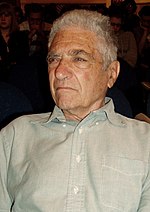Jack Steinberger
| Jack Steinberger | |
|---|---|

Jack Steinberger
|
|
| Born | Hans Jakob Steinberger May 25, 1921 Bad Kissingen |
| Nationality | Germany-United States-Switzerland |
| Fields | Physics |
| Institutions |
University of California, Berkeley Columbia University CERN |
| Academic advisors |
Edward Teller Enrico Fermi |
| Notable students |
Melvin Schwartz Eric L. Schwartz |
| Known for | Discovery of the muon neutrino |
| Notable awards |
Nobel Prize in Physics (1988) National Medal of Science (1988) Matteucci Medal (1990) |
| Spouse | Cynthia Alff |
Hans Jakob "Jack" Steinberger (born May 25, 1921) is an American physicist who, along with Leon Lederman and Melvin Schwartz, received the 1988 Nobel Prize in Physics for the discovery of the muon neutrino.
Steinberger was born in the city of Bad Kissingen in Bavaria, Germany, in 1921. The rise of Nazism in Germany, with its open anti-Semitism, prompted his parents, Ludwig (a cantor and religious teacher) and Berta, to send him out of the country.
Steinberger emigrated to the United States at the age of 13, making the trans-Atlantic trip with his brother Herbert. Jewish charities in the U.S. arranged for Barnett Farroll to care for him as a foster child. During this period, Steinberger attended New Trier Township High School, in Winnetka, Illinois.
Steinberger studied chemical engineering at Armour Institute of Technology (now Illinois Institute of Technology) but left after his scholarship ended to help supplement his family's income. He obtained a bachelor's degree in Chemistry from the University of Chicago, in 1942. Shortly thereafter, he joined the Signal Corps at MIT. With the help of the G.I. Bill, he returned to graduate studies at the University of Chicago in 1946, where he studied under Edward Teller and Enrico Fermi. His Ph.D. thesis concerned the energy spectrum of electrons emitted in muon decay; his results showed that this was a three-body decay, and implied the participation of two neutral particle in the decay (later identified as the electron (
ν
e) and muon (
ν
μ) neutrinos) rather than one.
...
Wikipedia
